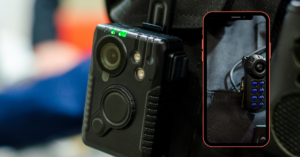Fleeing from police officers
You are driving down a Georgia road, minding your own business, not looking for trouble when trouble finds you. Yep, there they are– blue lights in the rearview. Maybe you have somewhere else to be, maybe you are truly terrified of police encounters, maybe you know you’ve been drinking, maybe you are suddenly afraid that this car you’re driving, the one your friend just let you borrow, is a stolen one, but whatever thoughts, fears, or concerns immediately run through your head, you have a very important decision to make, quickly: to flee or not to flee. It is a decision that only you, as the driver of the vehicle, can make, and the motivations to “run” from police can be many, from knowing/suspecting that there is contraband in the vehicle to believe that a warrant is pending for your arrest, but before making the decision to flee from officers in a vehicle, you need to at least be aware of the legal consequences of that decision.
Fleeing from pursuing police officers in a vehicle
One of three things will generally happen when you flee from pursuing police officers in a vehicle: (1) You will get away for the time being, but not for long; (2) you will be caught on scene; or (3) your flight will end in a wreck that severely injures or kills you, your passengers, or someone else who didn’t deserve it out on the streets. Sure, there is a slim chance that you may be among the tiny percentage of those who actually get away and never get caught, but you should understand that today’s technology makes it very likely that even if you do elude immediate capture, the police will eventually track you down. With so many cameras and the range of police radio, fleeing from police in a vehicle is simply a high-risk decision that is unlikely to yield a lasting reward, and new technologies are being implemented every day that continue to further shrink the possibilities of successfully eluding police. But when the blue lights flash, each of us has a brief moment in which to decide to pull over or to run.
You should also understand that Georgia law treats fleeing from police officers on foot very differently from fleeing from police in a vehicle. Fleeing from police on foot is an offense that will generally be treated as a misdemeanor, meaning that punishment carries no mandatory minimum sentence and maxes out at 12 months of jail time, which is still no picnic. Exceptions to this general rule would be offering threats or violence to officers, invading someone’s home or property, or causing harm to others in the process of fleeing. These and other additional facts can add to potential punishment ranges. However, merely fleeing from police in a vehicle under most conditions is punished, under a separate statute, much more harshly than fleeing on foot. The basic reasoning behind the drastic punishment increase is the idea that fleeing from police in a vehicle tends to create a much more desperate and dangerous situation for the general public at large. It is the increased risk of fatal injuries to pedestrians and other drivers, together with a much higher risk of major property damage, that is used to justify the severe penalties. So, what are those penalties?
Sentences for fleeing from police officers
Georgia Statute § 40-6-395 (see the italicized section below the full article) mandates that essentially any defendant convicted of fleeing from an officer in a vehicle will be required to serve a MANDATORY minimum sentence of one year in prison (but up to five years), which cannot be waived, suspended, or probated. The one year of prison also cannot be run concurrently (served at the same time) as any sentence received for other charges, which means that fleeing police in a vehicle adds a year of incarceration to any other punishment automatically, and the charge generally cannot be reduced. Additionally, a $5,000 fine can be imposed.
CRM Law, LLC has seen countless defendants who would otherwise not have faced incarceration but for the decision to flee from police in a vehicle, rather than stopping and dealing with what would have been a less serious legal problem. Consider just a few anecdotes: (1) a man who fled from police because he thought he had a warrant; it turned out he did not have a warrant and would have only received a $15 ticket for a seat belt violation had he just pulled over, but instead he wrecked his vehicle and faced a period of incarceration; (2) a pair of co-defendants who were ultimately acquitted at jury trial for charges alleging burglary and aggravated assault for a stabbing but served five years anyway because they were caught on scene after fleeing from police in a vehicle; (3) same as the previous scenario except the under-lying charges were multiple armed robberies for which the defendant was acquitted at trial on multiple counts, but the court took the entire proverbial pound of flesh at sentencing by running all fleeing charges (including reckless driving and others) consecutive so that defendant ended up serving substantial time even though he was acquitted on all major charges; and (4) numerous instances where a defendant fled from police in a vehicle because drugs were in the car only to resolve their respective cases so that the drug charges would have carried only probation but the fleeing charge required prison time. The list of potential examples could stretch much further. That said, a person may flee from police for a number of reasons, and the attorneys at the CRM LAW firm, are ready to defend the many reasons. However, citizens should understand that fleeing from police does complicate any criminal case, including to the extent that a jury may subconsciously or even overtly hold it against a defendant at trial when guilt or innocence is a close call for them.
Don’t flee from police officers – Do this!
In response to any traffic stop, CRM Law, LLC recommends pulling to the side of the road as soon as is safe to do so. Every thing that follows is a judgement call that only you, as the driver, can really make, but once stopped, we generally recommend considering each of the following: (1) Lower the volume of the car stereo; (2) If the weather conditions make it reasonable, and especially if the car windows are tinted, consider lowering the car windows so that officers can see into the vehicle easier, perhaps lowering their level of anxiety; (3) Stay calm and courteous, keep hands visible on the wheel of the vehicle; (4) Do exit the vehicle if instructed to do so, but only if instructed to do so; (5) Provide correct identification (failure to do so will result in additional charges); (6) do not admit to any violation of law; (7) Your decision to refuse all field sobriety (and blood and breath) tests should be dependent on the specific jurisdiction you are pulled over in, your prior history of violations, and extenuating circumstances, but be aware that you should not generally volunteer additional evidence to be used against you in court; (8) Do not consent to any police searches of your vehicle because you do not have to, and you should make the police rely on probable cause to justify any search, which can be challenged in court; (9) make no statements before or after arrest (voluntary statements by defendants are almost always the most difficult piece of evidence for attorneys to deal with, even if you think you are doing the best job ever of explaining everything away); and (10) assert your right to an attorney and contact CRM Law at 912-376-7901.
Fines for fleeing from the police
Let’s also not gloss over the $5,000 fine that can be and frequently is imposed against someone charged with fleeing from police in a vehicle. If you happen to be in a position where paying for an attorney would stretch your finances thin, as most people are, then you should also consider the fact that a $5,000 fine, especially if it is imposed in addition to a year in prison, will not be a pleasant experience, to say the least. Seeing the “po-po” behind you and deciding you “ain’t gonna stop” may be a popular suggestion in pop culture contributions to music like “Top Off” by DJ Khaled, Jay-Z, Future, and Beyoncé , but it is doubtful that those millionaires will be willing to pay your fine when you refuse to stop for the police. What’s financially alright for them probably won’t work out for you, and, frankly, it would probably work out better for them if they pulled over, which they probably know and would totally do in spite of the contrary lyrics that sell tracks.
Georgia Code Title 40. Motor Vehicles and Traffic § 40-6-395 (relevant portions)
(a) It shall be unlawful for any driver of a vehicle willfully to fail or refuse to bring his or her vehicle to a stop or otherwise to flee or attempt to elude a pursuing police vehicle or police officer when given a visual or an audible signal to bring the vehicle to a stop. The signal given by the police officer may be by hand, voice, emergency light, or siren. The officer giving such signal shall be in uniform prominently displaying his or her badge of office, and his or her vehicle shall be appropriately marked showing it to be an official police vehicle.
. . .
(5)(A) Any person violating the provisions of subsection (a) of this Code section who, while fleeing or attempting to elude a pursuing police vehicle or police officer:
(i) Operates his or her vehicle in excess of 20 miles an hour above the posted speed limit;
(ii) Strikes or collides with another vehicle or a pedestrian;
(iii) Flees in traffic conditions which place the general public at risk of receiving serious injuries;
(iv) Commits a violation of paragraph (5) of subsection (a) of Code Section 40-6-391; or
(v) Leaves the state
shall be guilty of a felony punishable by a fine of $5,000.00 or imprisonment for not less than one year nor more than five years or both.
(B) Following adjudication of guilt or imposition of sentence for a violation of subparagraph (A) of this paragraph, the sentence shall not be suspended, probated, deferred, or withheld, and the charge shall not be reduced to a lesser offense, merged with any other offense, or served concurrently with any other offense.




